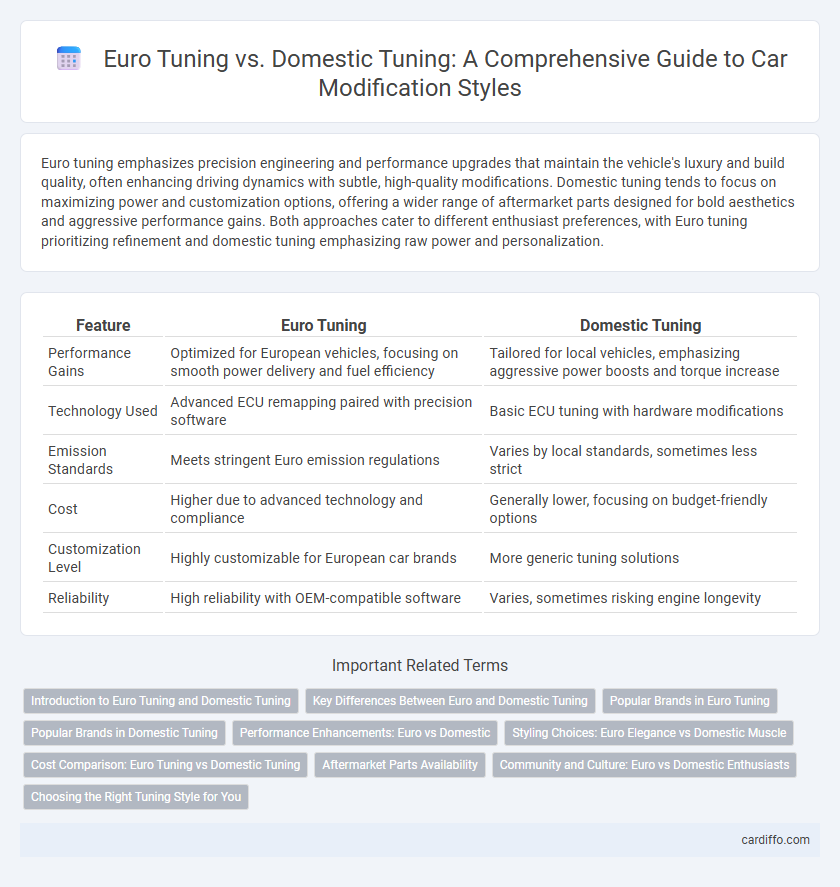Euro tuning emphasizes precision engineering and performance upgrades that maintain the vehicle's luxury and build quality, often enhancing driving dynamics with subtle, high-quality modifications. Domestic tuning tends to focus on maximizing power and customization options, offering a wider range of aftermarket parts designed for bold aesthetics and aggressive performance gains. Both approaches cater to different enthusiast preferences, with Euro tuning prioritizing refinement and domestic tuning emphasizing raw power and personalization.
Table of Comparison
| Feature | Euro Tuning | Domestic Tuning |
|---|---|---|
| Performance Gains | Optimized for European vehicles, focusing on smooth power delivery and fuel efficiency | Tailored for local vehicles, emphasizing aggressive power boosts and torque increase |
| Technology Used | Advanced ECU remapping paired with precision software | Basic ECU tuning with hardware modifications |
| Emission Standards | Meets stringent Euro emission regulations | Varies by local standards, sometimes less strict |
| Cost | Higher due to advanced technology and compliance | Generally lower, focusing on budget-friendly options |
| Customization Level | Highly customizable for European car brands | More generic tuning solutions |
| Reliability | High reliability with OEM-compatible software | Varies, sometimes risking engine longevity |
Introduction to Euro Tuning and Domestic Tuning
Euro Tuning involves precise calibration techniques tailored for European vehicles, enhancing engine performance and fuel efficiency while maintaining emissions compliance. Domestic Tuning focuses on optimizing vehicles manufactured locally, often emphasizing power gains and customizations suited to regional driving conditions and regulations. Both approaches require specialized software and hardware adjustments to meet specific performance goals.
Key Differences Between Euro and Domestic Tuning
Euro tuning emphasizes precision engineering to optimize performance while maintaining factory reliability standards, often focusing on turbocharged and high-performance engines. Domestic tuning prioritizes maximizing horsepower and torque with a broader range of modifications, frequently including aggressive ECU remaps and aftermarket parts tailored to muscle cars and V8 engines. Key differences include the approach to boost control, fuel mapping strategies, and the balance between power gains and drivetrain longevity, with Euro tuning favoring subtle enhancements and domestic tuning aiming for maximum output.
Popular Brands in Euro Tuning
Euro tuning dominates the modification scene with popular brands like APR, Revo, and Wagner Tuning providing specialized performance upgrades tailored for European vehicles such as Audi, BMW, and Volkswagen. These brands offer advanced ECU remaps, turbo enhancements, and suspension components engineered to maximize horsepower, torque, and handling precision. Compared to domestic tuning, Euro tuning emphasizes refined engineering and brand-specific solutions that maintain vehicle reliability while boosting performance.
Popular Brands in Domestic Tuning
Domestic tuning dominates the market with popular brands like HKS, Greddy, and A'PEXi known for high-performance parts tailored to local vehicle models and conditions. These brands specialize in engine management systems, exhaust components, and suspension upgrades that optimize power and handling for domestic cars. Their widespread availability and proven reliability make them preferred choices for enthusiasts seeking cost-effective and efficient modifications.
Performance Enhancements: Euro vs Domestic
Euro tuning prioritizes precise engine calibration and advanced software mapping, resulting in smoother power delivery, improved fuel efficiency, and enhanced overall performance specific to European car models. Domestic tuning often emphasizes raw horsepower gains and aggressive modifications, targeting muscle cars and trucks popular in the local market for immediate acceleration and torque boosts. Performance enhancements in Euro tuning typically involve ECU remapping and refined turbo management, while domestic tuning may rely more on hardware upgrades such as camshafts, exhaust systems, and forced induction kits.
Styling Choices: Euro Elegance vs Domestic Muscle
Euro tuning emphasizes sleek lines, refined detailing, and subtle enhancements that highlight vehicle elegance and craftsmanship, favoring aerodynamic body kits, minimalistic grilles, and polished finishes. Domestic tuning often prioritizes aggressive styling, bold muscle car features, and pronounced visual statements such as hood scoops, wide fenders, and vibrant paint schemes that evoke power and performance. These contrasting approaches reflect cultural preferences, with Euro tuning appealing to sophistication and understated style, while domestic tuning embraces rugged, high-impact aesthetics.
Cost Comparison: Euro Tuning vs Domestic Tuning
Euro tuning typically involves higher costs due to specialized parts and advanced software tailored for European vehicles, often ranging from $800 to $2,000 per session. Domestic tuning generally offers more affordable options, with prices usually between $400 and $1,200, reflecting easier access to compatible components and less complex calibration requirements. The cost difference stems from the exclusivity of Euro parts and the precision needed in tuning European engines compared to domestic counterparts.
Aftermarket Parts Availability
Euro tuning offers a wide range of specialized aftermarket parts designed for precision and performance enhancement, often sourced from high-quality European manufacturers. Domestic tuning has broader availability of parts with easier access and typically lower costs, focusing on popular models and mass-produced components. The choice between Euro and Domestic tuning depends on the specific vehicle make, desired performance goals, and the availability of compatible aftermarket parts.
Community and Culture: Euro vs Domestic Enthusiasts
Euro tuning enthusiasts often emphasize precision engineering, clean aesthetics, and performance upgrades rooted in European automotive heritage, fostering a community centered on brand loyalty and meticulous craftsmanship. Domestic tuning culture prioritizes bold customization, raw power enhancements, and a diverse range of vehicle platforms, creating a dynamic community driven by innovation and personal expression. Both communities cultivate strong social networks through events, forums, and clubs, reflecting distinct cultural values and shared passions in automotive modification.
Choosing the Right Tuning Style for You
Choosing the right tuning style depends on your vehicle preferences and performance goals. Euro tuning emphasizes precision engineering, often enhancing handling, suspension, and subtle engine modifications for a refined driving experience. Domestic tuning tends to focus on maximizing horsepower and torque with aggressive engine upgrades, making it ideal for muscle cars and raw power enthusiasts.
Euro Tuning vs Domestic Tuning Infographic

 cardiffo.com
cardiffo.com